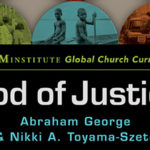WACO—Dead Man Walking—the story of the complicated relationship between death row inmate Elmo Patrick Sonnier and Catholic nun Helen Prejean—offers a picture of Christian forgiveness that balances the demands of love and justice, ethicist John Lippitt asserted.
Prejean recognized the horror of Sonnier’s crime but saw him as more than a “moral monster,” Lippitt told a Baylor University audience. The forgiveness she offered was based on his capacity for “moral growth and hoped-for repentance,” he said.

Lippitt, professor of ethics and philosophy of religion at the University of Hertfordshire in the United Kingdom, presented the Baylor Center for Christian Philosophy Homecoming Lecture on “Forgiveness, Resentment and Agapic Love.” The Baylor Institute for Studies of Religion co-sponsored the lecture.
Resentment not all bad
While many people insist forgiveness demands giving up all resentment and look upon resentment as an entirely negative response, Lippitt drew a distinction between harboring ill will over personal insults and feeling reasonable resentment over injustice.
“My claim is that forgiveness is ‘getting beyond’ resentment in some sense, but the scope of resentment has often been drawn too narrowly—that is, concerning only insults and injuries to oneself,” Lippitt said.
Lippitt built on the views of 18th century Anglican Bishop Joseph Butler, who saw resentment—provided it is not excessive—as a justice-motivated counterbalance to overly sentimental benevolence, Lippitt asserted.
While some theologians and moral philosophers have insisted the claims of agape love taught in the New Testament supersede justice and demand “gratuitous benevolence,” Lippitt generally commended the alternative view of American Christian philosopher Nicholas Wolterstorff, author of Justice in Love.
Forgiveness as a ‘work of love’
Wolterstorff asserts agape love calls for “care” rather than benevolence—caring enough to treat people with respect and to seek what is just and good for them, Lippitt explained.
While Lippitt sees Wolterstorff’s position as a dramatic improvement over “justice-indifferent benevolence,” he asserted it falls somewhat short in regard to forgiveness, which Wolterstorff makes conditional upon a wrongdoer’s repentance.
Sign up for our weekly edition and get all our headlines in your inbox on Thursdays
“My claim is that forgiving out of love can be a manifestation of care-agapism,” Lippitt said. “It makes room for unconditional forgiveness of a sort that incorporates hope for the wrongdoer—often including hope of future repentance.”
Not all pre-emptive forgiveness necessarily is admirable, he added. However, the kind of forgiveness Nelson Mandela demonstrated in South Africa—giving up some corrective rights for injustice against himself but holding accountable those who perpetuated apartheid—demonstrates forgiveness rooted in a sense of justice and grounded in hope, he asserted.
Forgiveness offered in hope can be “a catalyst for repentance,” he said. In that sense, Prejean’s attitude toward Sonnier and the forgiveness she offered him could be seen as what Søren Kierkegaard, the 19th century Danish philosopher and theologian, spoke of when he described forgiveness as a “work of love,” Lippitt said. Prejean’s work of Christian love for Sonnier looked beyond the evidence, because no immediately recognizable good qualities were clearly seen in him at the beginning of their relationship, he noted.
“It is a successful example of how treating people with agapic love can bring out the best in them,” he said.














We seek to connect God’s story and God’s people around the world. To learn more about God’s story, click here.
Send comments and feedback to Eric Black, our editor. For comments to be published, please specify “letter to the editor.” Maximum length for publication is 300 words.